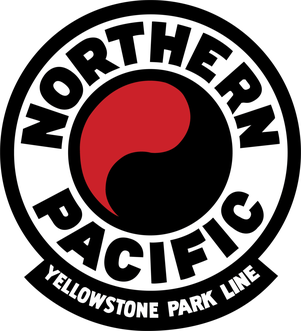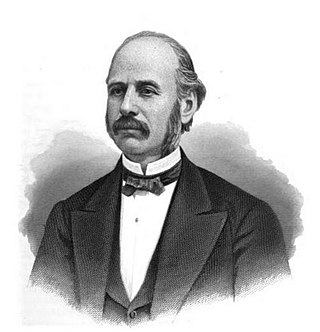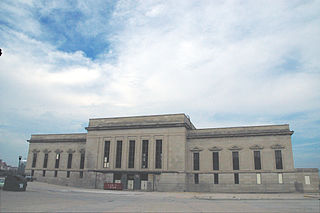
BNSF Railway is the largest freight railroad in the United States. One of six North American Class I railroads, BNSF has 36,000 employees, 33,400 miles (53,800 km) of track in 28 states, and over 8,000 locomotives. It has three transcontinental routes that provide rail connections between the western and eastern United States. BNSF trains traveled over 169 million miles in 2010, more than any other North American railroad.

The Burlington Northern Railroad was a United States-based railroad company formed from a merger of four major U.S. railroads. Burlington Northern operated between 1970 and 1995.

The Northern Pacific Railway was a transcontinental railroad that operated across the northern tier of the western United States, from Minnesota to the Pacific Northwest. It was approved by Congress in 1864 and given nearly 40 million acres of land grants, which it used to raise money in Europe for construction.

The Chicago, Burlington and Quincy Railroad was a railroad that operated in the Midwestern United States. Commonly referred to as the Burlington Route, the Burlington, or as the Q, it operated extensive trackage in the states of Colorado, Illinois, Iowa, Missouri, Nebraska, Wisconsin, Wyoming, and also in Texas through subsidiaries Colorado and Southern Railway, Fort Worth and Denver Railway, and Burlington-Rock Island Railroad. Its primary connections included Chicago, Minneapolis–Saint Paul, St. Louis, Kansas City, and Denver. Because of this extensive trackage in the midwest and mountain states, the railroad used the advertising slogans "Everywhere West", "Way of the Zephyrs", and "The Way West".

The Nebraska Zephyr was a streamlined passenger train operated by the Chicago, Burlington and Quincy Railroad between Chicago, Illinois; Omaha, Nebraska; and Lincoln, Nebraska, from 1947 to 1971. Until 1968, the service was provided by two Twin Cities Zephyr articulated trainsets — the "Train of the Gods" and "Train of the Goddesses" — that became synonymous with it. The Nebraska Zephyr was one of many trains discontinued when Amtrak began operations in 1971. The "Train of the Goddesses" set is preserved at the Illinois Railway Museum in Union, Illinois.
Henry Strong was the seventh president of the Atchison, Topeka and Santa Fe Railway.

Edward Payson Ripley, sometimes referred to as Edward P. Ripley or E. P. Ripley, was the fourteenth president of the Atchison, Topeka and Santa Fe Railway.

Amasa Stone, Jr. was an American industrialist who is best remembered for having created a regional railroad empire centered in the U.S. state of Ohio from 1860 to 1883. He gained fame in New England in the 1840s for building hundreds of bridges, most of them Howe truss bridges. After moving into railroad construction in 1848, Stone moved to Cleveland, Ohio, in 1850. Within four years he was a director of the Cleveland, Columbus and Cincinnati Railroad and the Cleveland, Painesville and Ashtabula Railroad. The latter merged with the Lake Shore and Michigan Southern Railway, of which Stone was appointed director. Stone was also a director or president of numerous railroads in Ohio, New York, Pennsylvania, Indiana, Illinois, Iowa, and Michigan.
The South Omaha Terminal Railway in Omaha, Nebraska was a subsidiary of the Union Stock Yards Company of Omaha. Until the separate railroad company was created in July 1927, the trackage, about 17 miles (27 km), was owned and operated directly by the Union Stock Yards Company of Omaha. On April 4, 1978, an Interstate Commerce Commission emergency service order was issued at which time the Brandon Corporation took over service.
The Atchison and Nebraska Railroad was a railroad company in the states of Kansas and Nebraska, United States.

The Burlington and Missouri River Railroad (B&MR) or sometimes (B&M) was an American railroad company incorporated in Iowa in 1852, with headquarters in Omaha, Nebraska. It was developed to build a railroad across the state of Iowa and began operations in 1856. It was acquired by the Chicago, Burlington and Quincy Railroad in 1872, and kept serving as its subsidiary.

Railroads in Omaha, Nebraska, have been integral to the growth and development of the city, the state of Nebraska, the Western United States and the entire United States. The convergence of many railroad forces upon the city was by happenstance and synergy, as none of the Omaha leaders had a comprehensive strategy for bringing railroads to the city.
The following is a brief history of the North American rail system, mainly through major changes to Class I railroads, the largest class by operating revenue.
The following is a brief history of the North American rail system, mainly through major changes to Class I railroads, the largest class by operating revenue.
Saltillo was an unincorporated community in Lancaster County, Nebraska, United States.
The Mississippi Valley and Western Railway (MV&W) was the name of three different shortline railroads which operated in the U.S. states of Iowa and Missouri. The first company was formed on January 25, 1871, and existed for just five days before merging with a much larger road. On January 20, 1873, two other railroads merged with the MV&W to create a second consolidated company. This last railroad went bankrupt on August 7, 1874, having constructed only a minimal amount of track. The bankrupt firm was sold to the St. Louis, Keokuk and North Western Railway.
A zephyr is a stream-liner train-set of locomotives or power cars with matching passenger cars. Zephyr train-sets with proper names include:








